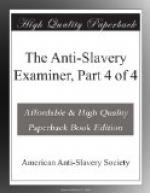1. That it was not by accident, that the primitive churches were made up of such elements, but the result of the DIVINE CHOICE—an arrangement of His wise and gracious Providence. The inference is natural, that this ordination was co-extensive with the triumphs of Christianity. It was nothing new or strange, that Jehovah had concealed his glory “from the wise and prudent, and had revealed it unto babes,” or that “the common people heard him gladly,” while “not many wise men after the flesh, not many mighty, not many noble, had been called.”
2. The description of character, which the apostle records, could be adapted only to what are reckoned the very dregs of humanity. The foolish and the weak, the base and the contemptible, in the estimation of worldly pride and wisdom—these were they whose broken hearts were reached, and moulded, and refreshed by the gospel; these were they whom the apostle took to his bosom as his own brethren.
[Footnote 25: 1 Cor. i. 27, 28.]
That slaves abounded at Corinth, may easily be admitted. They have a place in the enumeration of elements of which, according to the apostle, the church there was composed. The most remarkable class found there, consisted of “THINGS WHICH ARE NOT”—mere nobodies, not admitted to the privileges of men, but degraded to a level with “goods and chattels;” of whom no account was made in such arrangements of society as subserved the improvement, and dignity, and happiness of MANKIND. How accurately the description applies to those who are crushed under the chattel principle!
The reference which the apostle makes to the “deep poverty of the churches of Macedonia,"[26] and this to stir up the sluggish liberality of his Corinthian brethren, naturally leaves the impression, that the latter were by no means inferior to the former in the gifts of Providence. But, pressed with want and pinched by poverty as were the believers in “Macedonia and Achaia, it pleased them to make a certain contribution for the poor saints which were at Jerusalem."[27] Thus it appears, that Christians everywhere were familiar with contempt and indigence, so much so, that the apostle would dissuade such as had no families from assuming the responsibilities of the conjugal relation![28]
[Footnote 26: 2 Cor. viii. 2.]
[Footnote 27: Rom. xviii. 18-25.]
[Footnote 28: Cor. vii. 26, 27.]
Now, how did these good people treat each other? Did the few among them, who were esteemed wise, mighty, or noble, exert their influence and employ their power in oppressing the weak, in disposing of the “things that are not,” as marketable commodities!—kneeling with them in prayer in the evening, and putting them up at auction the next morning! Did the church sell any of the members to swell the “certain contribution for the poor saints at Jerusalem!” Far other wise—as far as possible!




